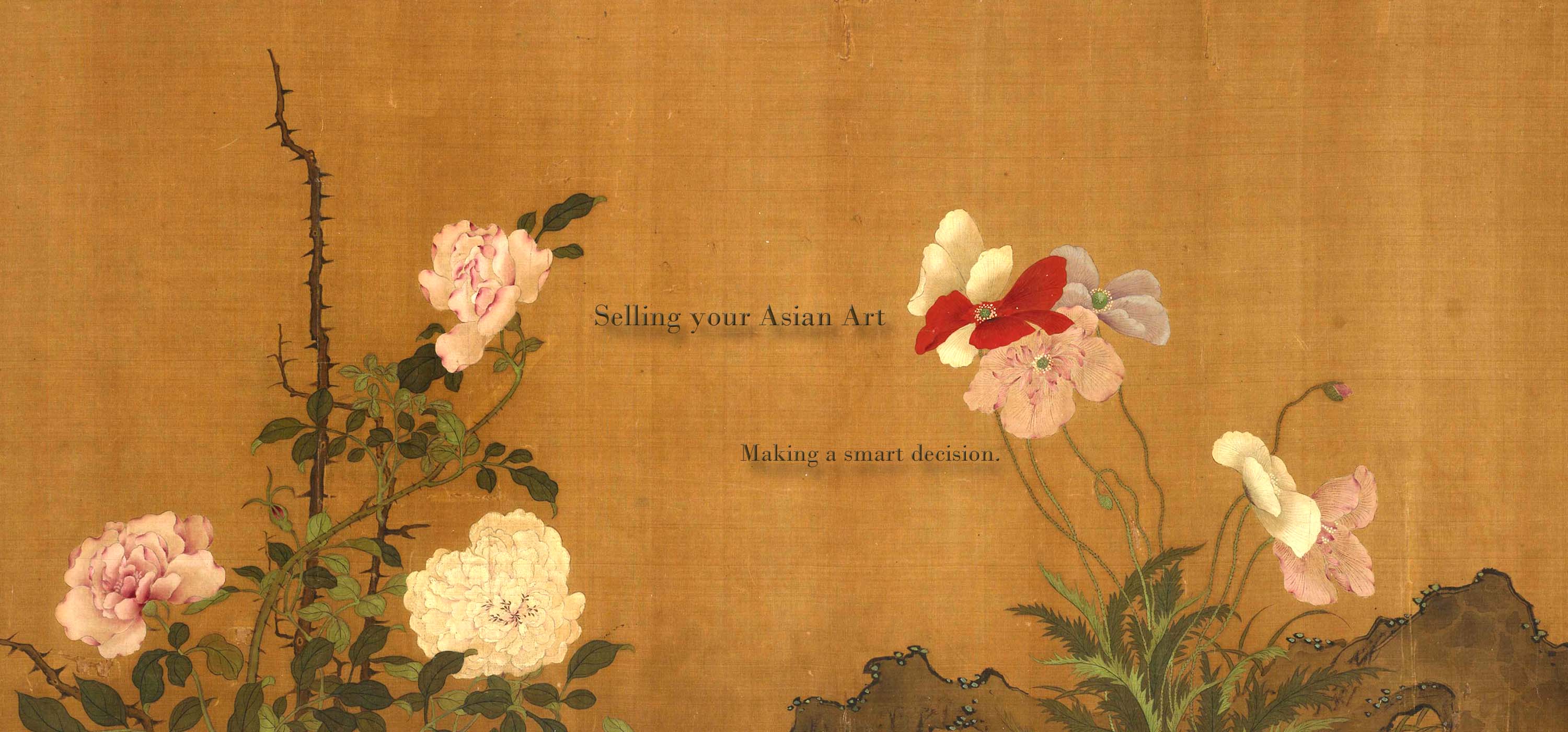Selling Asian Art Via Auction Or Direct Sale, The Pros And Cons

About The Asian Art Market, It's Bicameral Selling Environment
Selling Asian art, in particular, Chinese art and objects, in today's market offers two very obvious choices. To make sure you get the most money possible requires a little strategy on your part. Also some basic math.
In general, sellers can either make an auction consignment or a make a direct sale to a dealer, preferably a specialized one.
Dealers and Auctioneers will both give you a pricing evaluation(s) based on what they know about their own particular market. One will be higher than the other pretty much every time.
Dealers and Auctioneers do function in the same overall market but occupy different spheres that do overlap but are not the same.
Despite the common perception, auction houses do not always get the most money for items. As a result, dealers make up a huge percentage of buying dollars in the auction market. Conversely, some collectors prefer buying in a competitive environment over buying from a dealer. While other collectors prefer to buy exclusively from dealers 90% of the time.
This is why it's a good idea to check both possibilities before making a decision.
Selling Asian Art To A Dealer
The advantages of selling Asian art to a specialist dealer are fairly obvious.
Instant payment with no months of waiting for an auction to take place. Over and done with in minutes with instant payment.
Flexibility for the Seller. You as the seller can get "high" and "low" auction estimates, you can then ask t the dealer what he would pay right now, today for the item.
Auction houses can take anywhere from three to eight months to sell an item, you may not wish to wait that long.
Why Dealers prefer private purchases
Dealers prefer buying from private sources as it precludes their clients from being able to learn what they paid. After an auction everyone knows the prices, it's a public record.
Good Dealers know Collectors often prefer buying from dealers, as it keeps their buying private and doesn't leave a traceable sales history should they opt to sell in the future.
What's in it for you, the Seller?
Total Confidentiality, for some this is very important.
No negotiating commission rates.
No worries about changes in the market while waiting for an auction.
No disappointments if the piece doesn't sell at auction, or does but after commissions nets less than a dealer would have paid. (this does happen a lot.)
No worries about the buyer not paying the invoice after waiting months to sell the item(s). (It happens)
Selling Via Auction
The advantages of selling in an auction.
An opportunity to offer a rare item to a broad market, where price discovery or price predictability is unknown due to rarity.
If you have something that's not of a type with an easily estimable value, auctions can be a great way to go. As the market will decide for you, as it always does by its very nature. They can be enormously fun to participate in and very exciting. They can also be equally disappointing, so be prepared either way.
Price Predictability; Most experienced auctioneers can estimate fairly accurately what an item will realize based on their own history. You can then figure out rather easily what to expect for proceeds.
Like selling to a Dealer, Auctions are a viable way to liquidate collections. You must however in most scenarios have the luxury of time to do so.
Auctioneers may know a few people who've been searching for the very thing you wish to sell, which is a good combination for an abnormally high result.
Always get Auction Estimates and Offers From A Specialist Dealer First, and then make a decision.
Doing these two things will make the decision process much less complicated.
How To Go About It.
Are You Thinking Of Selling Asian Art? To a Dealer or through an Auction?
If you have an item(s) you want to sell, you have a couple options. You can get a presale estimate from an auction house and then consign it. You can sell it directly yourself to a dealer like us for instant payment. We would urge you to check both options!
Yes, do both, call an Auctioneer and Call Us.
- Call An Auctioneer, make an appointment and see what they anticipate your object(s) will bring. Be sure to ask for the "High and Low" estimate(s) at auction. Also about "Reserves" the minimum price you are willing to accept at auction. Also, ask how long will it be before the item is sold and how quickly they pay you afterward. (typically 35 to 45 days post auction if the buyer pays on time.)
-
UNDERSTANDING AUCTION MATH. Ask the Auctioneer what they charge both you i.e. "Seller Commission" and the winning bidder i.e. "Buyer's Commission" (aka Buyer's Premium). Seller Commissions average 10% to 25%. Winning bidders pay a Comission to the Auctioneer based on the Selling or "Hammer Price", it usually ranges from 18% to 25%. This is important to know as most buyer's set a MAXIMUM bid including the Buyer's Premium, which dictates how high in TOTAL they are willing to go. The entire "Buyer's Commision" goes to the Auction House.
Example: if an object sells for $1,000. The Bidder pays $1,000 plus 25% = $1,250. The seller gets $1,000 minus 20% = $800. Auction house makes $400 from your $800.
- The Dealer, Call Us. We'll examine your item(s) at no obligation, we can make you an offer on the spot. You get paid for the full amount immediately.
- If you are selling Asian art from an old Chinese collection, be sure to call us.
Contact Us For An Offer or Information
Related

Telephone No.978 283 3524
